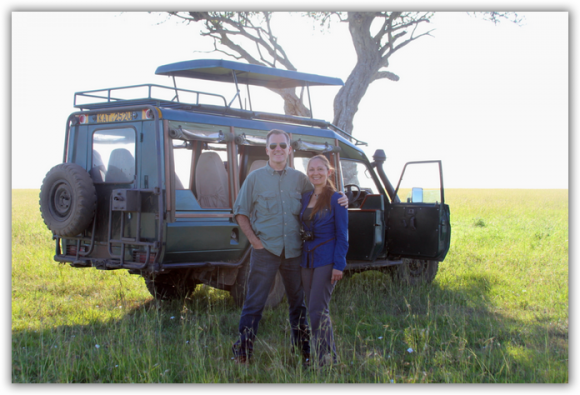aNewDomain.net — If you can work from home, you can work from Rome — and afford it, too. Here’s our Mike Elgan on the astonishing economics of being a digital nomad — and the experience of living the “adventure homelessness” lifestyle. It’s an adventure, alright … and the food is terrific.
So I’m a digital nomad. I can work from anywhere, thanks to the Internet, which means I have the luxury of living a lifestyle you might call “adventure homelessness.”
I’m not poor.
In fact, I make a good living writing opinion columns. But because my wife and I love foreign travel, we got rid of half of our stuff and put the rest into storage awhile ago. For the last 15 months, we’ve lived in Greece, Turkey, Kenya, Spain, Morocco, Italy and even in the United States, where we’re currently “visiting” before we head abroad again in January.
Because of my incessant “success theater” posts on Google+, showing all the beautiful and exotic locations I constantly find myself in, I’m frequently accused of having too much money. I’m asked the following three questions all the time: How can you afford it? Are you living on a trust fund? And, most commonly, How can I get your job?
The answers are: Easy, no and possibly.
The economics of living as a digital nomad are spectacularly non-intuitive. So I’m going to tell you three astonishing facts about it that will blow your mind and make you want to do it yourself.
1. People think living abroad is expensive because vacations are expensive.
Taking a two-week vacation to, say, Europe is very expensive. So when I tell people that I live in Greece or Spain for three months each, they calculate out vacation costs and generalize a massive pile of dough.
There are two reasons why vacations are expensive. The first is that much of what you pay for is redundant. When you get a hotel room, you’re buying shelter. But during that two weeks, you’re also paying for the shelter back home you’re not using.
You pay transportation, such as trains, cab fare and buses while also making your car and insurance payments on the car sitting unused in your driveway. The same goes for all those hidden costs, such as electricity, water, TV and Internet connectivity.
During those two weeks you’re paying for two lives but living only one.
The second reason a vacation is expensive is that while on vacation, you pay exorbitant prices for things. Your nightly rate for a hotel is way more than what your house or apartment costs per night. Your restaurant food costs way more than the food you would make at home from groceries. Do the math. Vacation costs are astronomically higher.
None of these costly factors exist for nomads. By not paying a mortgage or rent back home, nor keeping a car, you eliminate all that duplicated expense, paying only for what you’re using at any given time.
And by seeking out monthly rental situations and making most of your meals yourself, I stay outside vacation-industry pricing.

Thanks to Airbnb and equivalents, plus Craigslist and other Internet listings, you can find highly-favorable housing before you arrive. And once there, you can get even-better deals that aren’t listed online. We typically pay between $500 and $1,200 per month — and that’s in an expensive area like Europe. In some Latin American or Asian countries, you find really nice houses to rent for as little as $200 per month. Fully furnished, too.
Americans believe that food is inexpensive in the United States. This is a myth. Food is far cheaper in most other countries. By shopping in local stores and markets, you pay a fraction for food that you would pay for in the U.S.
2. The cost of being a digital nomad is radically flexible.
One of the traps of conventional living is that basic costs of living are more or less fixed. If you buy, rent or lease the big-ticket items like a house and a car, plus the requisite utilities, insurance, maintenance, cable and Internet bill and all the rest, you’re on the hook for these expenses no matter what happens with your income.
Oftentimes, a drop in income or a rise in costs — say you start a new business — forces people into debt. That begins a financial-death spiral, one that is fantastically expensive in the long run.
When you’re an international nomad, costs are as flexible as income. If you experience a drop in pay, or you need extra money to start a business, you just move to a super-cheap country for 6 months or longer. You save a bundle this way.
The fact that this option always exists gives you peace of mind, even if you don’t take advantage of it.
In a nutshell, you’ll find a general correlation around the world between pay and cost of living. Where pay is higher — Silicon Valley, New York, Tokyo — the cost of living is higher, too. Where pay is lower — say Chang Mai, Cuenca, Kathmandu — the cost of living is rock-bottom low.
As a digital nomad, I’m paid as if I live in Silicon Valley, where I used to live. But if I want to save money or hoard cash, I can move to Kathmandu and take advantage of the lopsided cash-flow of first-world income and third-world expenses.
3. The best things in life really are free.
When you live in one place, novelty is expensive. Try a new restaurant, go to a new movie, take a cooking class — you do it all just to experience the warm glow of novelty.
But when you live in a new place every few weeks or months, everything is always new. So you don’t have to buy any newness. Get bored? Move.
One stark contrast: The best meal I ever had in the United States cost hundreds of dollars for four people. It was really different.
But outside the U.S., the best meal I ever had cost about $12, wine included. It was in Florence, Italy, and we picnicked at sunset on an old bridge over the Arno River.
Here’s the Google Glass video I took, in case you want to see what that was like.
It was a great meal because it was all so incredibly new. And free. The sky was free. The bridge was free. The air was free — and so was the atmosphere.
Living as a digital nomad involves constant fun, adventure and novelty. And the economics of it are astonishingly good.
So how do you get a job that enables you to live abroad as a digital nomad?
Well, I can’t tell you that because I don’t know your work, experience or options. But I can give you a hint: Figure out how to land a job where you work from home.
Because if you can work from home, you can work from Rome.
For aNewDomain.net, I’m Mike Elgan.
Based everywhere, Mike Elgan is a veteran tech journalist and tech culture columnist. He writes most-visibly and frequently at Computerworld, Datamation, Cult of Mac, Houzz, PC World, InfoWorld, MacWorld, CIO Magazine, The San Francisco Chronicle and The CMO Site. Now Mike is a senior commentator with us at aNewDomain.net. Follow Mike’s stream on Google+ and on Twitter @MikeElgan. The best way to reach him is via Google+. Email Mike here at aNewDomain at MikeE@aNewDomain.net.













Well said. Based on my personal experience traveling with our family for over a year it wasn’t much more expensive than staying at home and much more fun. You have to plan everything possible to reduce costs. And you have to give up your original residence as you said.
Beautifully done! Jealous.
What about flight costs?
Flights over seas are relatively cheaper. And if you’re not paying for a mortgage or car payments, if you have to drop 400 per person to move to a place for 6 months, that costs you 300 a month to rent an apartment, big whoop! :)
what about health insurance and what if a person has dogs?
Obviously you can’t have a dog… and good question about health insurance. I would assume there is no health insurance, you pay for what you need when and if you need it.
I am thinking you can home school kids – -esp if you use the amazing homeschool guidelines in California — and what better education than travel? Amazing piece +MIKE ELGAN
Biggest revelation from this article was the expense of paying for home residence while travelling.
Great article! I work from home but have 5 kids, something to think about when the nest is empty!
[…] I came across Mike Elgan’s post on aNewDomain.net about being a nomadic blogger, journalist, and writer for major publications. […]
[…] Mike Elgan: The Astonishing Economics of My Nomad Life Abroad by Mike Elgan […]
This is a wonderful article. +Mike Elgan is an excellent writer and this article will make many of us think about the life we currently live and what we could be doing.. seeing the world, as many of us have dreamed about. Thank you +Gina Smith for sharing this
Very cool piece Mike. Thank you for sharing.